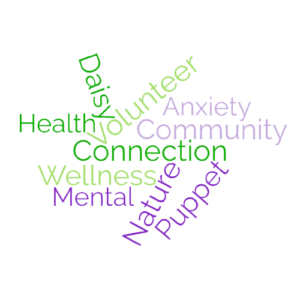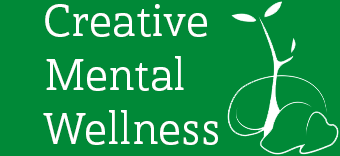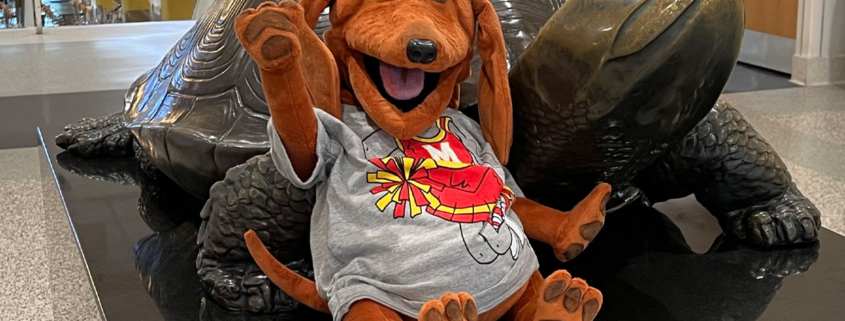September 2023 Newsletter
Welcome to our First Newsletter!
Introducing DAISY the Mental Health Dachshund (and Her Human Seanda)

My name is DAISY, and I’m known as “DAISY the Mental Health Dachshund.” I’d like to introduce myself and Seanda (that’s the human I work with, and–btw–her name is pronounced SHAWN-DUH). We decided to work together because we noticed how many people–children, youth, and adults–are struggling with/suffering from mental health issues. We decided that we could put our knowledge, experience, and talents together to create a way to educate the public about mental health topics and mental illness while we try to normalize discussing such topics and decrease the stigma of mental illness.
BTW- we practice what’s called RADICAL TRANSPARENCY. (We give as much information as we can in an effort to PURPOSELY decrease anxiety– because people usually feel better when they feel there’s no hidden agenda and a person is being authentic.) If you notice that I sometimes OVER-INFORM (give a little too much information about the topic at hand), YOU’RE RIGHT (and “getting” our nifty STYLE)!
First, I’ll tell you a little about Seanda. For a human, she’s pretty nice. Her mother died when she was 16 (I can’t count very high, but I remember she’s in her 50s now), she’s an only child, and she struggled with infertility (and was unable to conceive following treatments). Following her mother’s death in 1985, Seanda perceived that mental health problems/mental illness was a personal, shameful weakness. Her journey accessing mental health care started then, and she’s been very disappointed in the amount of progress in the system since she began the journey.
Seanda is a registered nurse. (I don’t really understand the human education system, but she has what they call a “master’s degree” in nursing.) With her nursing education/experience along with her life experience relative to accessing the mental health care system, Seanda has a unique understanding of the system. She wants to encourage discussions about mental health topics (to decrease the stigma about “mental health”/mental illness) work on making it more accessible to all people, educate people of all ages about mental health topics, and help people feel better while they struggle with managing their mental health (just like she struggles).
I recently joined up with Seanda (when the puppet-maker stork delivered me to her) to make it easier to engage children–and maybe a few adults–in discussions of mental health topics (like anxiety, depression, schizophrenia, and even suicide) while being age-appropriate. (Seanda feels the importance of talking about suicide with children is relative to discussing “bad touch” and death with them; it can be done without making it scary but such that it educates the child and emotionally prepares them if something traumatizing does occur.) Seanda & I know how important it is to enable and encourage mental health discussions in an accepting environment so people feel comfortable enough (and “feel seen”). The impact of a global pandemic has amplified many mental health challenges, and we want to do whatever we can to decrease the suffering associated with those challenges.
Here at CR38V3 M1ND5, we strive to make the world a happier, healthier place. We know that sometimes all it takes to change one’s life is a little support. Since our founding in January of 2020, we have been determined to make an impact by providing mental health outreach and resources to those who need it.
The Essential Mental Health Pillars:
CONNECTION, NATURE, & VOLUNTEERING
Improving one’s mental health doesn’t have to be complicated or costly. There are 3 MENTAL HEALTH PILLARS that are easily accessible and inexpensive, yet have a significant impact on enhancing one’s quality of life: CONNECTING to other people, spending time outdoors/in NATURE, and engaging in VOLUNTEERING.

1. Connecting to Other People:
Human beings thrive on social connections for both practical and emotional reasons. Building and nurturing meaningful relationships with others is vital for our mental well-being and attaining an optimum level of health. When we connect with others, we experience a sense of belonging, support, and understanding. This connection provides emotional nourishment and helps us navigate life’s challenges.
Benefits of connecting to other people for mental health include:
a. Emotional Support: Sharing our thoughts, feelings, and experiences with trusted individuals can provide a sense of validation and comfort. It allows us to feel understood and less alone in our struggles.
b. Increased Resilience: Social support networks offer a safety net during difficult times. They provide us with resources, advice, and different perspectives, enhancing our ability to cope with stress and adversity.
c. Positive Influence: Being around supportive and positive individuals can inspire us, boost our self-esteem, and encourage personal growth. It helps create a nurturing environment where we feel empowered to pursue our goals and aspirations.
💚 NOTE: A Comment About CONNECTING WITH OTHERS in 2023

Connecting with a diverse group of people–including those who share our values as well as those who hold different perspectives–offers a range of benefits for personal growth and mental well-being. One significant benefit is the opportunity to learn and practice getting along with individuals from diverse backgrounds and thoughts, which can contribute to lowering anxiety levels. When we engage with people who have different beliefs and experiences, it challenges our own perspectives and expands our understanding of the world. By actively seeking out diverse connections, we learn to navigate and appreciate differences, fostering empathy, tolerance, and open-mindedness. This process helps to reduce anxiety by reducing the fear and discomfort that may arise from interacting with individuals who are different from us. Embracing diversity and building connections across various backgrounds enhances our social skills, broadens our knowledge, and promotes a more inclusive and harmonious society. From a practical standpoint, we just FEEL better when we have positive connections with others.
Unfortunately, in today’s fast-paced and digitally connected world, genuine human connection often takes a backseat. Factors such as social media dependency, busy schedules, and societal pressures can hinder our ability to form deep and meaningful connections. It is crucial to make a conscious effort to prioritize face-to-face interactions, engage in active listening, and foster supportive relationships. YOU DESERVE THE HIGHEST LEVEL OF HEALTH…AND YOU’RE WORTH IT!!!!!
💚NOTE: CONNECTIONS and COMMUNITIES
When discussing the importance of connecting to others, it is crucial to highlight the relationship between connections to individuals and communities. Building connections with people on an individual level is significant and allows us to establish deep and meaningful bonds, providing a sense of belonging and support. However, connections to communities go beyond individual relationships and play a vital role in our overall well-being. Communities provide a broader sense of identity, shared values, and a sense of belonging to something larger than ourselves. They offer opportunities for collective action, social engagement, and mutual support. Community connections foster a sense of solidarity, social cohesion, and shared responsibility, ultimately contributing to the overall health and resilience of individuals within the community. By acknowledging the importance of both individual and community connections, we can cultivate a holistic approach to building and maintaining meaningful relationships, benefiting not only ourselves but also the larger social fabric in which we exist.
2. Increasing Time Spent Outdoors in Nature:
Nature has a profound impact on our mental health. It provides a sanctuary away from the demands and stressors of daily life. Spending time outdoors in natural environments can have a rejuvenating effect on our mental well-being. Being outdoors in the sunshine and fresh air, surrounded by plants and animals, offers numerous benefits for our well-being. Additionally, observing and interacting with animals can spark a sense of wonder and appreciation for the beauty and diversity of the natural world, fostering a deeper connection with our environment.
Benefits of spending time outdoors for mental health include:
a. Stress Reduction: Just spending time outdoors in nature can have a calming effect on the mind and body. The sights, sounds, and smells of natural surroundings can help reduce stress, anxiety, and depression. It promotes relaxation and improves overall mood. Sunshine stimulates the production of needed vitamin D. Connecting with nature allows us to disconnect from the stressors of daily life, promoting relaxation, reducing anxiety, and improving our mood. Being in the presence of plants and animals has a calming effect on the mind, fostering a sense of peace and harmony.
b. Enhanced Cognitive Function: Being in nature has been linked to improved focus, creativity, and problem-solving abilities. It allows our minds to relax, recharge, and function at their best. Breathing in fresh air promotes a sense of rejuvenation and clarity, improving cognitive function and overall mental well-being.
c. Physical Activity and Well-being: Ensuring physical activity is included as part of a healthy lifestyle is a way to CARE FOR YOURSELF! Taking care of your body also helps care for your mind.

Physical activity helps improve cardiovascular health, strengthens muscles and bones, and enhances overall physical fitness. Regular exercise also plays a crucial role in weight management, reducing the risk of chronic diseases such as obesity, diabetes, and heart conditions.
Stimulating the production and release of various neurotransmitters in the brain is another positive effect of physical exercise. Such neurotransmitters have a direct impact on our mood and mental well-being. For instance, exercise increases the production of endorphins, which are natural chemicals that act as painkillers and mood boosters. These endorphins create a sense of euphoria and overall well-being, often referred to as the “runner’s high.”
Physical activity also promotes the release of serotonin, a neurotransmitter known for its role in regulating mood, sleep, and appetite. Higher serotonin levels are associated with improved mood, reduced symptoms of depression, and increased feelings of happiness and contentment.
Additionally, physical activity increases the production of dopamine, which is involved in reward and motivation pathways. Dopamine release during exercise can contribute to a sense of pleasure, motivation, and a positive outlook on life. Overall, the stimulation of neurotransmitter production through physical activity creates a chemical cascade that positively impacts mood, promoting feelings of happiness, relaxation, and overall mental well-being.
Exercise has been shown to reduce symptoms of anxiety and depression, improving mental resilience and self-esteem. It can also enhance cognitive function, including memory, attention, and problem-solving abilities. Engaging in physical activity provides an outlet for stress, helps in managing emotions, and fosters a more positive outlook on life.
Engaging in outdoor activities, such as walking, hiking, or gardening, combines the benefits of nature and exercise.
3. Volunteering:
Volunteering not only benefits the community but also has a positive impact on mental health. Focusing on helping others and engaging in acts of service provides a sense of purpose, satisfaction, and fulfillment.
Benefits of volunteering for mental health include:

a. Increased Self-Esteem and Purpose: Volunteering gives a sense of meaning and value by contributing to something larger than oneself. It enhances self-esteem, self-worth, and personal identity.
b. Reduced Feelings of Isolation: Engaging in volunteer work connects us to a community of like-minded individuals. It fosters social connections and combats feelings of loneliness and isolation.
c. Distraction from Ruminating Thoughts: By directing our focus and energy toward helping others, volunteering can divert attention from our own problems and negative thought patterns. It promotes a positive mindset and resilience.
Although volunteering has numerous benefits, it is often overlooked due to perceived time constraints or the belief that personal problems should take priority. It is important to recognize that even small acts of kindness and service can make a significant difference in our own well-being and the lives of others.
💚 NOTE OF MOTIVATION (for CONNECTING, being in NATURE, and VOLUNTEERING more): Being healthier generally makes navigating life easier. When we FEEL better, we tend to be more EFFICIENT/PRODUCTIVE/EFFECTIVE and HAPPIER!!!! 😀

Daisy Practices
spending time outdoors

Daisy spends time outdoors because the fresh air feels nice, and she enjoys the sounds of nature. She particularly likes the sounds the Chickadees make – sometimes referred to as the “feebee” call. As she spends time outside throughout the year, she also gets to watch the leaves turn color and fall in autumn, and she can watch as the grasses turn green and the flowers bloom in spring and summer. Aside from her conscious enjoyment of nature, her walks in the park get her blood pumping and muscles working. Many of us are left sitting all day, whether in school or at work, but a short walk every day can help stave off the negative effects of a sedentary lifestyle. Coupling the walk with time outdoors can increase enjoyment, as well as the physical benefits of exercise. Daisy hopes you can take a walk outside this week and enjoy the vast array of benefits!
Thank you for joining us on this mental health journey! Follow us on Instagram, Facebook or LinkedIn to stay up to date.
Your friend,













Leave a Reply
Want to join the discussion?Feel free to contribute!